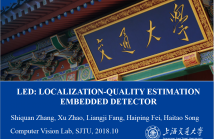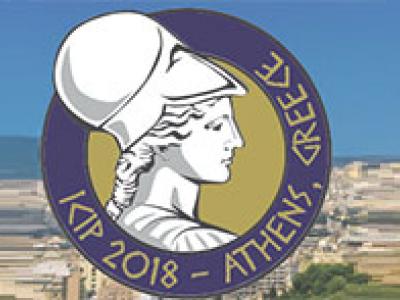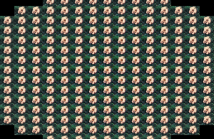- Image/Video Storage, Retrieval
- Image/Video Processing
- Image/Video Coding
- Image Scanning, Display, and Printing
- Image Formation

Classification subnetwork and box regression subnetwork are
essential components in deep networks for object detection.
However, we observe a contradiction that before NMS, some
better localized detections do not correspond to higher classification confidences, and vice versa. This contradiction exists because classification confidences can not fully reflect the
localization-quality (loc-quality) of each detection. In this
work, we propose the Localization-quality Estimation embedded Detector abbreviated as LED, and a corresponding
- Categories:
 91 Views
91 Views
- Read more about Image Fusion and Reconstruction of Compressed Data: A Joint Approach
- Log in to post comments
In the context of data fusion, pansharpening refers to the combination of a panchromatic (PAN) and a multispectral (MS) image, aimed at generating an image that features both the high spatial resolution of the former and high spectral diversity of the latter.
In this work we present a model to jointly solve the problem of data fusion and reconstruction of a compressed image; the latter is envisioned to be generated solely with optical on-board instruments, and stored in place of the original sources.
- Categories:
 29 Views
29 Views
- Read more about Learning Semantics-Guided Visual Attention for Few-shot Image Classification
- Log in to post comments
We propose a deep learning framework for few-shot image classification, which exploits information across label semantics and image domains, so that regions of interest can be properly attended for improved classification. The proposed semantics-guided attention module is able to focus on most relevant regions in an image, while the attended image samples allow data augmentation and alleviate possible overfitting during FSL training. Promising performances are presented in our experiments, in which we consider both closed and open-world settings.
- Categories:
 77 Views
77 Views
In recent years, light fields have become a major research topic and their applications span across the entire spectrum of classical image processing. Among the different methods used to capture a light field are the lenslet cameras, such as those developed by Lytro. While these cameras give a lot of freedom to the user, they also create light field views that suffer from a number of artefacts. As a result, it is common to ignore a significant subset of these views when doing high-level light field processing.
- Categories:
 80 Views
80 Views
- Read more about Unsupervised Trajectory Modeling based on Discrete Descriptors for classifying Moving Objects in video Sequences
- Log in to post comments
- Categories:
 14 Views
14 Views
- Read more about Unsupervised Trajectory Modeling based on Discrete Descriptors for classifying Moving Objects in video Sequences
- Log in to post comments
- Categories:
 16 Views
16 Views
- Read more about TOWARDS A GENERIC COMPRESSION SOLUTION FOR DENSELY AND SPARSELY SAMPLED LIGHT FIELD DATA
- Log in to post comments
Light field acquisition technologies capture spatial and angular information of the scene. The angular information paves
the way for various post-processing applications, e.g. scene reconstruction, refocusing, synthetic aperture. The light field
is usually captured by a single plenoptic camera or by multiple traditional cameras. The former captures dense light
- Categories:
 24 Views
24 Views
- Read more about An Interior Point Method for Nonnegative Sparse Signal Reconstruction
- Log in to post comments
We present a primal-dual interior point method (IPM) with a novel preconditioner to solve the ℓ1-norm regularized least square problem for nonnegative sparse signal reconstruction. IPM is a second-order method that uses both gradient and Hessian information to compute effective search directions and achieve super-linear convergence rates. It therefore requires many fewer iterations than first-order methods such as iterative shrinkage/thresholding algorithms (ISTA) that only achieve sub-linear convergence rates.
- Categories:
 12 Views
12 Views
- Read more about A HYBRID PRIOR MODEL FOR TUNABLE DIODE LASER ABSORPTION TOMOGRAPHY
- Log in to post comments
Model based methods have gained popularity in the past few decades in reconstruction problems particularly when the measurement data is sparse. In model based inference, apart from a model for the measurements, there exists a model for the unknown signal to be reconstructed, called the prior model. Model based methods tend to do very well when the prior model is accurate and representative of real world behavior of the unknown signal.
- Categories:
 22 Views
22 Views
- Read more about BLIND IMAGE QUALITY ASSESSMENT WITH A PROBABILISTIC QUALITY REPRESENTATION
- Log in to post comments
PQR_ICIP.pdf
- Categories:
 28 Views
28 Views